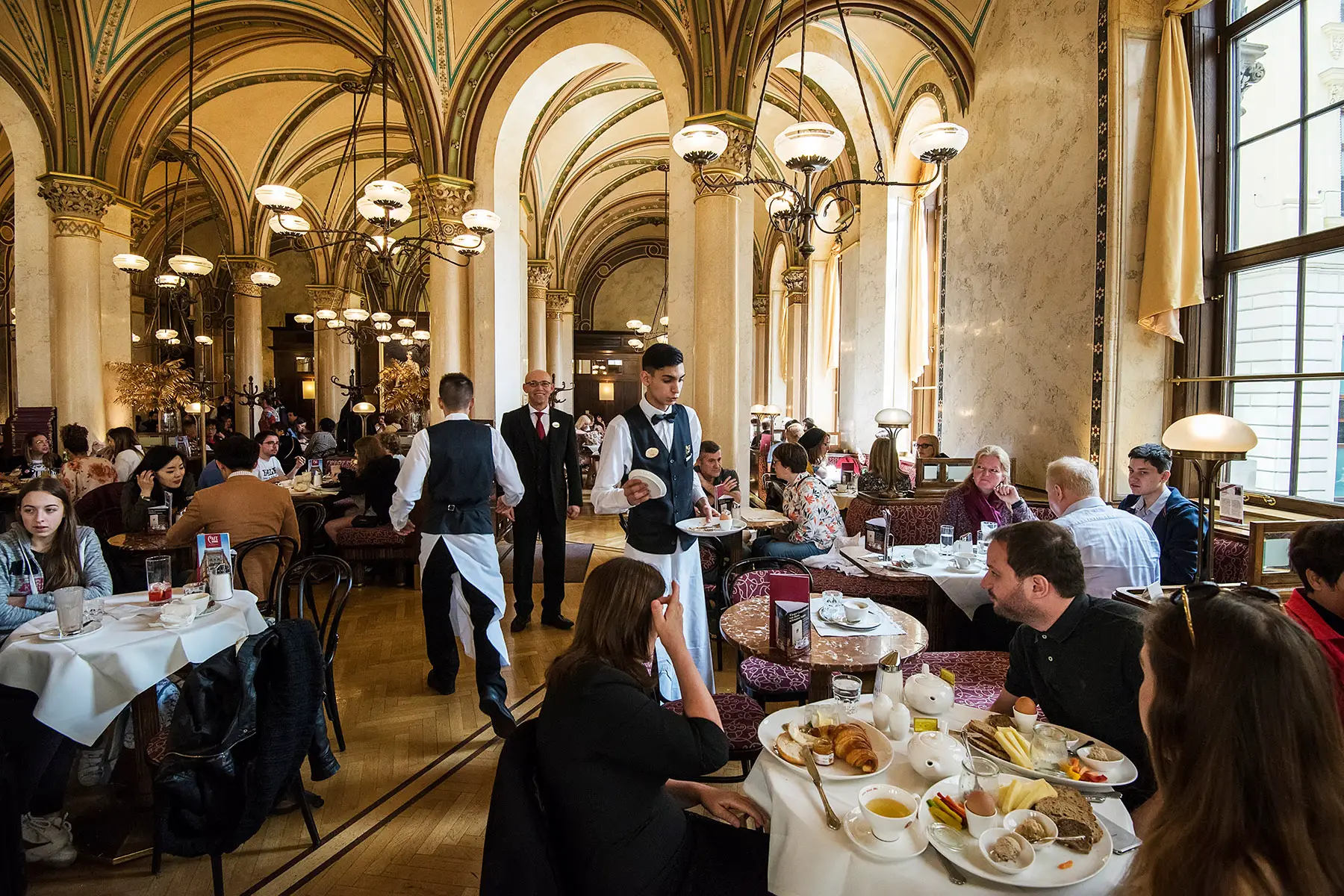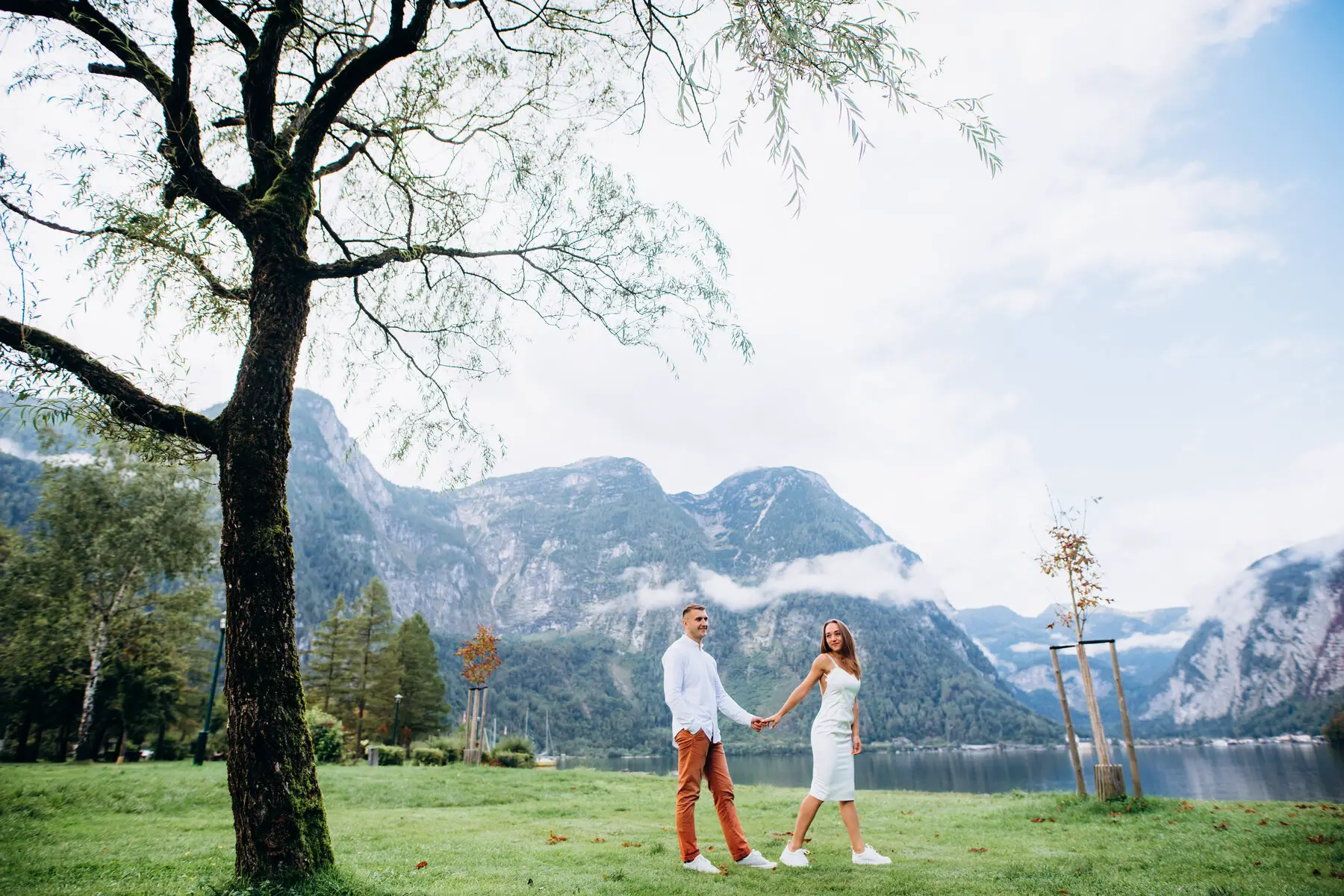Every country has its own quirks and it can be useful to understand these as an expat. Getting to grips with Austrian etiquette and culture can help you engage properly with locals and ensure that your business dealings go well. Because of this, you should pay attention to the nuances of social niceties in the country.
To get you off on the right foot, this helpful guide breaks down the most important aspects of social etiquette in Austria, including the following:
- Austrian culture and society
- Gender roles in Austria
- Meeting and greeting people in Austria
- Conversation and communication in Austria
- Clothing and dress code in Austria
- Dining etiquette in Austria
- Socializing in Austria
- Relationships in Austria
- Work and business culture in Austria
- Shopping and services in Austria
- Celebrations in Austria
- Tips on culture and etiquette in Austria
- Useful resources
Sirelo
It's no secret that moving abroad can be stressful. Sirelo's team of removal advisers is here to help. They provide five free quotes from international shipping companies so you can find the best options at the best prices. Take the stress out of your relocation to Austria with Sirelo.
Austrian culture and society
Generally speaking, Austrian etiquette and society follows the norms of Germany. This means that Austrians are polite, formal, and have a level of reserve. They also follow many of the same languages, religions, and traditions as Germany.

Catholicism is an integral part of Austrian society. However, the Austrian constitution enshrines freedom of religion and there are many minority religions in the country. Nevertheless, in 2018, over 56.9% of the population identified as Catholic, while 7.9% identified as Muslim in 2016.
German is the official language of Austria. As such, 98% of Austrians speak German as their native language. Of course, there are also many regional dialects within the country. Nevertheless, speaking German will bring you far more social and business opportunities. However, some regions recognize Croatian, Slovenian, and Hungarian as official languages, too. This is because they see an influx of immigrants from these countries. Additionally, most local schools teach English as the main foreign language.
Austria is a largely egalitarian society. Whether discussing gender, class, or other divisions, Austria offers a greater degree of equality than many other countries. In fact, on the Power Distance dimension, Austria scores 11, which means that the country places emphasis on equality and participative communication. As a result, it has a very strong social welfare system that covers health, education, employment, and retirement needs.
Politically, Austria is a very democratic society. As a Federal Republic, it has a parliament made up of five political parties that include conservatives, liberals, and greens. All Austrians can vote from the age of 16. Perhaps because of its reasonably diverse political landscape, patriotism does not play the same role in Austria as it does in other countries such as the United States. In addition, anti-immigrant and anti-Islam sentiment is on the rise in Austria and has become a recent political flashpoint. As a result, these groups are sometimes marginalized in society. Although the traditional class system is now far less prevalent, it does still exist to a certain extent and is largely built across economic lines.
Gender roles in Austria
In Austria, both genders are more or less equal. This is especially true among the younger generations. In fact, Austria’s constitutional law protects gender equality. As such, Austrian etiquette generally sees that women and men are treated the same in society. Nevertheless, there are still some inequalities. For instance, while women are certainly gaining pace in education and employment, there is still a significant gender pay gap.

In fact, statistics show that 20.6% of women hold an academic degree. Conversely, only 16.8% of men do so. Similarly, in 2021, the employment rate of women from 15 to 64 years was 68.1%, 8% less than men. That said, 2020 figures show that women are still earning 18.9% less than men.
Despite this, traditional gender norms often still prevail in Austria. As such, this is still a country of nuclear families where men are the head of the household. However, younger urban couples are becoming more equal, with men becoming more involved in household chores and childcare. Additionally, government assistance is pushing gender equality in the home. For example, when having a child, parental leave can be split between the mother and father, enabling women to return to work.
Meeting and greeting people in Austria
Austrian etiquette dictates a certain level of formality in social situations. This is because most Austrians tend to be more reserved, at least until they feel a level of connection with others. Therefore, formal greetings are very much the norm.

As such, you will find that handshakes are very common. Generally, you will shake someone’s hand when you first meet them, and certainly in business settings. In addition, you should offer formal verbal greetings, such as “Guten Morgen” (good morning), “Guten Tag” (good tag), or “Guten Abend” (good evening). But, informally – or between family and good friends – women might lightly hug or offer two light air kisses on the cheek. You can also add verbal greetings such as “Hallo” (hello) or “Servus” (hi).
Because of the formality of Austrian etiquette, you should always greet Austrian people with titles. This is especially true in business meetings. Try and use professional titles, if available – like “Doktor” – or “Herr” (Mr). In general, first names are only used with friends, family, and people you know well.
Austrian etiquette also dictates that you should never show up at someone’s home without warning. Instead, you should always call ahead and make plans to visit someone in their home.
Conversation and communication in Austria
Once again, Austrian etiquette requires a certain level of reserve in conversation. In general, you should expect a formal, polite style of communication. That said, with better acquaintance, this should become more warm and open. Similarly, Austrians tend to be very direct, honest, and straight to the point. However, this is tempered with a subtle – often cynical – humor. You should also remember that Austrians don’t tend to ask personal questions until they know you quite well. You might also find this to be true when dating Austrian men and women.
When it comes to conversational topics, you can never go wrong with talking about Austria’s stunning natural beauty and regional diversity. However, Austrians also love enriching conversation, so try to avoid banal small talk about the weather (unless it is especially pertinent). Instead, try and engage people in topics they are interested in.
Of course, being a rather conservative society, there are also some topics that you should avoid. This includes WWII and the Holocaust because they are still very sensitive topics in Austria. Migration is also a divisive topic, so be careful with this.
Body language in Austria
Austrian etiquette allows for a very continental style of body language. If you are European, you will probably be very familiar with how to act. In general, Austrians allow a certain amount of physical contact with people they know, such as hugging and light touches. However, you generally wouldn’t touch during a conversation as this would be more of an invasion of privacy. Similarly, you should respect personal space, so keep at least an arm’s length between someone you are talking to.

Conversely, eye contact is very important during conversations. Austrians see this as polite and a sign of respect – although you probably shouldn’t stare. Similarly, hand gestures are not that common. In conversation, words are more important than using your hands for emphasis.
Clothing and dress code in Austria
Austria’s Catholic traditions mean that people here tend to be quite conservative and this applies to their dress sense, too. They also dislike attracting attention to themselves. As such, you won’t usually see very skimpy or overly outrageous outfits. Instead, aim for quiet elegance and sophistication. You should also remember that Vienna is separate from the rest of the country, and people tend to dress up more for the opera or theatre, so feel free to go all out. You can never be overdressed for these occasions.
In general, casual dress for women involves dresses or skirts in summer or pants and sweaters in winter. For men, pants and collared shirts are always appropriate. In addition, Austrians usually favor dark, solid colors or simple patterns. Athletic gear is also frowned upon, as are sneakers and Birkenstocks. For business, men usually dress formally. This means dark suits with a dress shirt and tie. Similarly, women favor conservative dresses or a skirt suit.
Dining etiquette in Austria
When it comes to eating, Austrian etiquette follows the norms of polite European dining. This means not gesturing with utensils and not having your elbows on the table. Additionally, you should not begin eating until everyone has been served and the host says “Guten Appetit”. Of course, there are a few other rules particular to the country, as follows:
- Hosts will always offer a second service – if you don’t want this, just offer a polite “Nein, danke” (no, thank you).
- Dinner is often the main meal for socializing.
- Formally, the host usually gives the first toast – guests return this later. You should raise your glass and maintain eye contact, and say “Prost” (cheers).
- The person who extends the invitation for a meal out usually pays the bill – don’t argue.
- Put your napkin on your lap as soon as you sit down.
- Try to finish everything on your plate.
- Put your knife and fork together on your plate with the handles to the right to indicate that you have finished your meal.
Socializing in Austria
Coffee houses have a long tradition in Austria. Because of this, they are an integral part of the country’s social life. Whether you slip in for a quick coffee and catch up or end up sitting down for a long, lingering meal with friends, you will likely get to know the country’s coffee houses very well.

In addition, people usually socialize at restaurants, bars, and go to the theater or movies. In this sense, socializing is very similar to the rest of the world. Because of Austria’s fantastic natural landscapes, socializing outdoors is also common. This might mean walks, hikes, and outdoor sports.
As in much of the rest of Europe, it is legal to drink in Austria at 16. Drinking is very much part of the culture. In fact, Austrians tend to drink far more than the average European.
Relationships in Austria
Surprisingly, Austrians tend to take a reasonably casual approach to dating. Nevertheless, conversation is important on a date. As such, on a first date, you will probably end up at a café, bar, or restaurant where you can easily talk. Later on, you might do other simple things like going to the movies, the theater, or perhaps just for a walk. In general, Austrians split the check during dates – at the very least, you should make the effort.
As part of their casual approach to relationships, most Austrians end up meeting their significant other’s parents early on in the relationship. But, again, this is usually in a very offhand manner, such as casually showing up to a family brunch. Although people do still meet through friends or in real-life situations, many Austrians now also use dating apps and websites.

Just like in their other social interactions, Austrians can be conservative when it comes to dating. Often, they may come off as shy. Certainly, flirting is not really a thing. Conversely, they are very at ease with public displays of affection. So much so, in fact, that the country is cracking down on this a bit. That said, kissing is not banned in Vienna’s underground trains.
Most Austrians date with a view to eventually getting married. However, the younger generation tends to delay marriage until they feel they know their partner well and are financially secure. In addition, same-sex marriage has been legal in Austria since January 2019. As such, Austria generally takes a tolerate view of same-sex relationships, although this is less so in rural areas and among the older generation.
Work and business culture in Austria
Austrian etiquette requires a high level of formality in business. Organization, punctuality, and details are very much appreciated.
Here are a few points to remember when it comes to working in Austria:
- Schedule meetings well in advance – try for six weeks for executive-level meetings.
- The summer (July and August) and Christmas holidays are write-offs, so most people are away or non-responsive.
- Always be punctual – call if you are going to be late, and try not to cancel last-minute.
- In emails and written correspondence, be sure to use the correct title of the person you are writing to.
- Indulge in a little light conversation before getting down to business in meetings.
- Don’t waste people’s time – make sure you run meetings with a detailed agenda and according to hierarchy.
- Business relationships are usually kept very formal and there is a strict divide between private and working lives.
- Business cards should have German translations if possible.
- When answering a phone, state your name and company and offer a greeting like “Guten Morgen”.
- At a business lunch or dinner, business is only discussed at the invitation of the host.
- Introductions go a long way in business in Austria, so try and get one from a mutual contact.
- Avoid hard-selling, high-pressure tactics, and confrontations.
Shopping and services in Austria
In keeping with the politesse of Austrian etiquette, interactions with retailers and public service staff come with a degree of formality. As such, you should always greet sales staff when entering and leaving a shop. In general, Austrian customer service is decent – although not quite amazing – and is often delivered in an aloof manner. By extension, service is usually included, so you should only need to tip minimally.

Again, thanks to the rigid formality of Austrian culture, queuing is very much a part of daily life. Therefore, make sure to fall in line if you see a queue, otherwise, you could be in for some stern words and dirty looks.
Celebrations in Austria
In general, celebrations in Austria tend to be reasonably low-key. Nevertheless, Austrians certainly do celebrate milestone occasions – like birthdays, graduations, and weddings – as well as religious festivals (Easter, Christmas) and important holidays such as New Year’s. In general, celebrations are marked by gatherings, meals, and drinks. However, on religious occasions, this might also include mass at the local church.
Gifts in Austria
In Austria, you might bring a hostess gift to a casual celebration at someone’s house. Often, this means flowers, chocolate, or alcohol. In addition, gifts are usually appropriate for major celebrations like birthdays, weddings, and Christmas. However, gifts should always be moderate, and not overly lavish or expensive. In addition, adults will often give gifts to their friend’s children, rather than their friends. In general, gifts are opened immediately instead of keeping them for later. Being polite and formal, Austrians will often send a thank you card or message for major occasion gifts, such as wedding presents.
Tips on culture and etiquette in Austria
Here are a few useful dos and don’ts to remember while living in Austria:
- Always be punctual and avoid canceling last-minute
- Maintain a level of reserve, formality, and politeness
- Try not to call attention to yourself
- Never drop by someone’s house unannounced
- If hosting a party, take your role as host seriously and see to the formalities
- Austrian etiquette is important, so pay attention to dining norms
- Maintain personal space and privacy
- Weekends are for families, especially Sundays when most Austrians visit their parents or grandparents
- Invites should always be extended well in advance
- Appearances matter, so maintain a high level of grooming and presentation
Useful resources
- BBC Languages Across Europe (Austria) – a page about the languages of Austria
- Cultural Atlas (Austria) – a page about Austrian culture and etiquette
- Migration Austria (The political, administrative, and legal systems) – a government page about Austrian politics
- Statistics Austria – a government page about gender statistics in Austria
- Commisceo Global – a resource site about language, culture, customs, and etiquette in Austria






